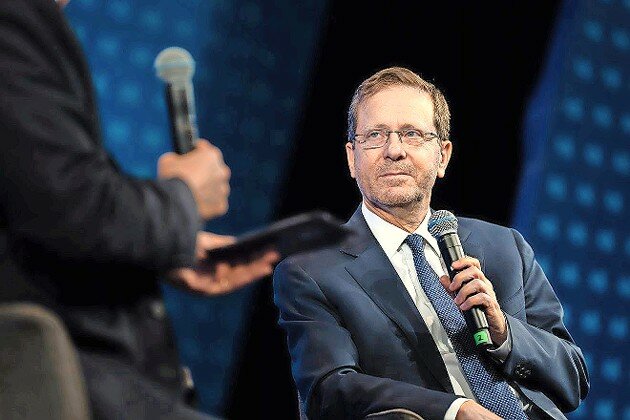AJC forum tackles tests facing Jewish people
Political heavyweights and prominent journalists discussed key issues affecting Israel and the Jewish people at the opening plenary of the American Jewish Committee’s second AJC Global Forum in Tel Aviv on Sunday evening.
Those issues included rising antisemitism, the Abraham Accords and Israeli-Diaspora relations.
One thousand persons from 60 nations were in attendance at the opening event, with a total of 1,500 expected throughout the four-day forum.
Ted Deutch, in his inaugural AJC Global Forum address as CEO, celebrated the success Israel has achieved on its 75th anniversary. He noted that Israel has become a technological powerhouse, a vibrant democracy with “perhaps the freest of free presses anywhere in the world,” and a staunch defender of civil rights.
“Also, I would note we gather here today just at the conclusion of Tel Aviv Pride, one of the largest LGBTQ gatherings in the world,” he said to loud applause.
Despite the successes, Israel faces many challenges, which the forum would focus on, Deutch said. The challenges, both foreign and domestic, include the Iranian nuclear threat, Gaza rockets and “widening rifts within Israel between the political left and the political right, between religious and secular Jews, and between Israelis and Diaspora Jewry.”
Iran came up frequently throughout the evening. Deutch asked opposition leader Yair Lapid why the world has stood against Russia’s invasion of Ukraine but not against Iran to the same degree.
“Part of the problem we have now is that [Iran] is not at the center of global attention,” Lapid said, noting that the world, and the US specifically, is preoccupied with other issues such as Ukraine and China, even though in the case of the war in Ukraine, Tehran has become one of Russia’s only allies.
“It’s further proof, if anyone needed further proof, that whatever is wrong in this world, Iran is going to be involved,” Lapid said.
Lapid said that the current US administration views signing a deal with Iran as the “easiest way to take the Iran issue off the table” so it can focus on matters it considers more urgent. This would be a costly mistake, Lapid warned, stressing that there is no daylight between Israel’s opposition and coalition on Iran. All speak with one voice, “telling the American administration: ‘Do not sign a bad deal’.”
AJC’s activities extend beyond America and the organization boasts 14 overseas offices. As a result, several European leaders addressed the conference.
Lithuanian Prime Minister Ingrida Šimonytė stressed the growing cooperation between Teh-ran and Moscow, where “Russia gets access to Iran’s weapons supply and Iran, at the same time, [gets] a cover for advancing its nuclear program and inflaming regional instability.
“My country has done much more than just usual public condemnation. In recent months, at least five Iranian drone companies were sanctioned by the EU on our initiative,” said Šimonytė, who met with Israeli Prime Minister Benjamin Netanyahu on Monday, where they discussed regional issues, especially the Iranian threat.
Margaritis Schinas, European Commission vice president for promoting our European way of life, credited the AJC “for being an active and trusted partner” in the inception and implementation of an EU strategy laid out in October 2021, “the first ever to fight against antisemitism and promote Jewish life in Europe.”
Karoline Edtstadler, Austrian federal minister for the EU and constitution, said, “Austria has a special historic responsibility, a responsibility that is tied to two issues that are essential to us: safeguarding and protecting Jews in Austria and Europe and beyond and supporting Israel whenever it is threatened.”
Israeli President Isaac Herzog also attended the opening plenary. Of the judicial reform talks that are taking place under his auspices, Herzog said, “Perhaps it’s good that it has come up now as a public issue, as a really in-depth discussion of where we are and where we are going as a nation.
“These are critical days and I sincerely hope that the leaders and the elected officials will take the right decisions, because not only the people of Israel want a wide agreement and consensus on the core issues without, of course, hurting the basic rules of democracy and the independence of the judiciary, but more importantly, I also feel that in this room, the Jewish world demands us not to be torn apart, and want us to move forward with a dialogue,” Herzog said.
A panel of journalists also focused largely on judicial reform. Channel 12 political commentator Amit Segal, who identifies with Israel’s right wing, said that “judicial reform is dead, but no one has informed the family yet.
“My guess is somewhere between days and months [from now], Netanyahu will take 5 percent of judicial reform, declare a victory and retreat,” Segal said.

 55.0°,
Mostly Cloudy
55.0°,
Mostly Cloudy 




